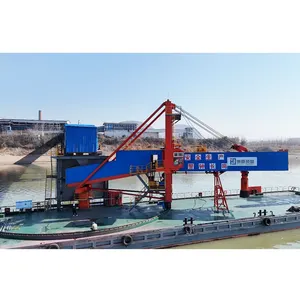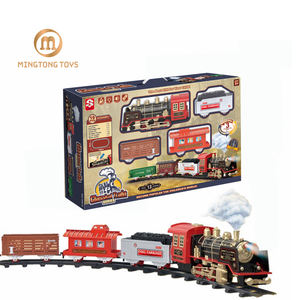
Professional Factory Ship Loader With Belt Telescopic Conveyors For Building Materials Coal Cereals Fodder Mineral Mompounds





Railway freights refer to the transportation of goods and commodities through a rail network. This mode of shipment is particularly advantageous for businesses seeking an efficient, cost-effective, and environmentally friendly way to move large volumes of goods over land. It is a suitable option for industries ranging from agriculture and manufacturing to retail and automotive, which require the transportation of bulk items across great distances.
The principle of railway freight transportation relies on trains pulling a series of cargo wagons or containers. These railcars are designed to carry diverse types of cargo, including raw materials, finished goods, heavy machinery, and even hazardous substances with specialized safety features. The railway system operates on fixed schedules and routes, providing predictability and consistency in service.
For businesses, the allure of railway freight lies in its ability to combine high capacity with reliability, while typically offering lower emissions per ton-mile than road transport. This transport method is governed by logistics planning that coordinates the pick-up, transit, and delivery of goods to ensure timely arrival at the intended destination. Railway freight services are integrated with other logistics solutions like trucking and shipping to provide door-to-door delivery, often known as intermodal transportation.
Railway freights come in different forms to cater to various shipping needs:
Bulk Freight: This type involves large quantities of goods that are not packaged separately and are usually transported in hopper cars or tank cars. Bulk freight is ideal for commodities like coal, grains, minerals, and liquids.
Intermodal Freight: A versatile type of railway freight that involves containers which can be transferred between different modes of transport without directly handling the cargo itself. This type is commonly used for goods that need to be transported over long distances using a combination of rail, ship, and truck.
Specialized Freight: For oversized or heavy items that cannot be transported through conventional means, specialized freight services provide flatcars or well cars equipped to handle such loads. Machinery, industrial components, and construction materials are typical cargos for this service.
Refrigerated Freight: Perishable goods such as food products and pharmaceuticals require refrigerated or temperature-controlled railcars. These specialized cars ensure that the cargo maintains its quality during transit.
General Cargo: This category includes boxcars or covered wagons that carry packaged goods from various industries. These general-purpose freight cars can handle a wide range of cargo including boxed, palletized, or other securely loaded merchandise.
Selecting the appropriate railway freight service requires careful consideration of several factors:
Assess the nature of your goods: Different products have varying requirements in terms of handling and transportation conditions. For example, perishable items may require refrigerated freight services while bulk materials might be best suited for bulk freight options.
Consider the volume and weight: The amount and weight of your shipment will influence the type of railcar needed. Bulk commodities typically leverage the economies of scale offered by bulk freight cars, whereas smaller shipments might fit into a general cargo car.
Evaluate transit time requirements: Although rail transport is generally reliable with fixed schedules, transit times can vary based on the route and service type chosen. Intermodal services might offer more flexibility with potential cost savings when combined with other transportation modes.
Look at end-to-end logistics: If your shipment needs additional transportation support beyond rail services – such as pick-up by truck from your facilities – an intermodal freight solution might be necessary.
By taking these factors into account and understanding the distinct advantages each type of railway freight offers, businesses can make informed decisions that align with their logistical needs and budgetary constraints.
Alibaba.com stands out as a global marketplace connecting buyers with suppliers offering a myriad of railway freight options tailored to meet diverse logistical challenges. With over two decades of experience in facilitating international trade solutions, Alibaba.com has established itself as a reliable platform for business-to-business transactions. The site's extensive network encompasses suppliers capable of providing comprehensive railway freight services to destinations worldwide, ensuring businesses can find efficient shipping solutions regardless of their geographic location.
The platform's user-friendly interface allows buyers to filter through multiple options based on destination, departure date, departure city, and service advantages like "Fast Delivery" or "Excellent Service." Moreover, Alibaba.com's commitment to trust and quality is exemplified through its Trade Assurance program which protects payments up until delivery completion. This program reflects Alibaba's dedication to providing secure transactions and peace of mind for its users.
By choosing Alibaba.com for your railway freight needs, you gain access not only to a vast selection of shipping options but also the benefit of dealing with verified suppliers who are committed to delivering value-driven services. Through this platform, businesses can streamline their supply chain operations while tapping into new opportunities for growth in the global market.
Railway freight transportation is the movement of goods by rail. It is a cost-effective and efficient method for shipping large volumes of cargo over land and can handle a variety of goods including bulk items, containers, specialized equipment, and perishables.
Businesses of all sizes that need to transport goods across significant distances can benefit from railway freight services. This includes industries such as manufacturing, agriculture, retail, automotive, and many others that require the shipment of bulk or heavy goods.
Consider the nature of your products, the volume and weight of the shipment, your transit time requirements, and the need for additional logistics services such as trucking for last-mile delivery. The choice of service should align with these factors.
Intermodal railway freight services involve the transportation of cargo in a container or vehicle using multiple modes of transportation (rail, ship, and truck) without any direct handling of the freight itself when changing modes.
Yes, there are specialized railway freight services available for oversized or heavy items that cannot be transported through conventional means. These typically involve flatcars or well cars designed to accommodate such loads.
Perishable goods can be transported via railway freight using refrigerated railcars or temperature-controlled containers to ensure that the quality of the cargo is maintained throughout the journey.
Railway freight is often more cost-effective than road transport for large volume shipments due to economies of scale. Additionally, trains have lower fuel costs per ton-mile when compared to trucks.
Railway freight is generally considered more environmentally friendly than road transport as trains emit fewer greenhouse gases per ton-mile of cargo moved.
Railway freight transportation may have limitations in terms of flexibility and route accessibility compared to road transport. It relies on fixed schedules and rail network routes, which may not cover all destinations.
Many railway freight service providers offer tracking options that allow you to monitor your shipment's progress in real-time or through regular updates.
In case of delays, most service providers will inform you and provide updates on the new expected arrival time. Some may also offer alternative solutions to minimize disruptions in your supply chain.
You can coordinate with your railway freight service provider or a third-party logistics company to arrange for last-mile delivery by truck from the train station to your final destination.
The required documentation typically includes a bill of lading, commercial invoice, packing list, and any other documents related to customs clearance or specific cargo requirements.
Transporting hazardous materials by rail requires adherence to strict regulations and standards. Railcars used for hazardous materials are designed with specialized safety features and handlers are trained in proper procedures to ensure safe transit.